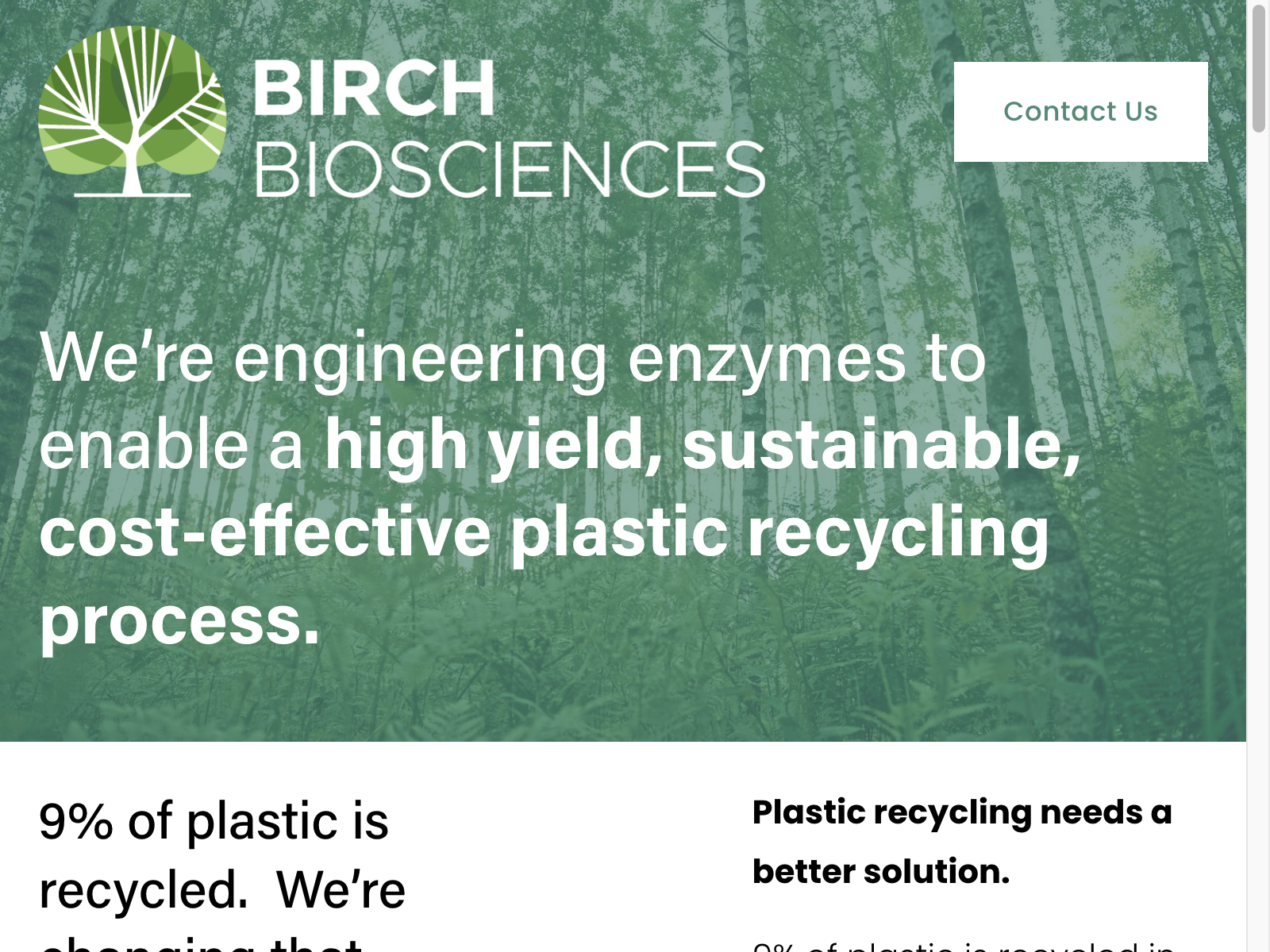Birch Biosciences: AI-powered Enzyme Engineering

Birch Biosciences Overview
Birch Biosciences is a startup company based in Portland, Oregon that engineers enzymes for plastic recycling using synthetic biology and machine learning. Their innovative approach combines the power of AI with cutting-edge biotechnology to tackle the global plastic waste crisis.
Birch Biosciences' mission is to revolutionize the recycling industry by developing highly efficient enzymes that can break down even the most challenging plastic materials. Through their proprietary AI algorithms and extensive research, they are able to identify and optimize enzyme variants that can effectively depolymerize a wide range of plastic polymers, paving the way for a more sustainable future.
Birch Biosciences Key Features
- AI-powered Enzyme Engineering: Birch Biosciences leverages advanced machine learning algorithms to rapidly screen and optimize enzyme candidates, accelerating the development of highly efficient plastic-degrading enzymes.
- Synthetic Biology Expertise: The company's team of experts in synthetic biology and molecular biology apply their deep understanding of biological systems to engineer enzymes with enhanced performance and specificity.
- Comprehensive Plastic Recycling Solutions: Birch Biosciences' enzymes can tackle a diverse range of plastic waste, from common packaging materials to complex, multi-layered plastics, providing a comprehensive solution for plastic recycling.
- Scalable and Sustainable Production: The company's enzymes can be produced at scale using renewable resources, ensuring a sustainable and environmentally-friendly approach to plastic recycling.
Birch Biosciences Use Cases
Birch Biosciences' AI-engineered enzymes have a wide range of applications in the plastic recycling industry, including:
- Household Plastic Waste Recycling: Birch Biosciences' enzymes can be used to efficiently break down commonly found plastic waste in households, such as plastic bottles, bags, and containers.
- Commercial and Industrial Plastic Recycling: The company's enzymes can tackle more complex plastic waste streams, including those found in commercial and industrial settings, enabling the recycling of a broader range of plastic products.
- Multi-layered Plastic Recycling: Birch Biosciences' enzymes can effectively depolymerize even the most challenging plastic materials, including multi-layered and composite plastics, which are typically difficult to recycle.
Birch Biosciences Pros and Cons
Pros:
- Highly efficient and versatile enzymes for plastic recycling
- Innovative use of AI and synthetic biology to develop cutting-edge solutions
- Scalable and sustainable production of enzymes
- Potential to significantly improve plastic recycling rates and reduce environmental impact
Cons:
- Relatively new technology, still in the early stages of development and commercialization
- Potential challenges in scaling up production and ensuring consistent enzyme performance
- Reliance on ongoing research and development to continuously improve the technology
Birch Biosciences Pricing
Birch Biosciences offers a range of pricing options for their AI-engineered enzymes, catering to the diverse needs of their customers. Here's a breakdown of their pricing structure:
| Product | Price |
|---|---|
| Enzyme Samples | $99 per sample |
| Pilot-scale Enzyme Production | $5,000 per batch |
| Commercial-scale Enzyme Production | Custom pricing based on volume and specifications |
Birch Biosciences Alternatives
While Birch Biosciences is a unique and innovative player in the plastic recycling industry, there are a few other notable alternatives worth considering:
- Carbios: A French company that also uses engineered enzymes to break down various plastic polymers, including PET and polyolefins.
- Enzymatic Inc.: A US-based startup that develops enzymatic solutions for the recycling of polyester-based plastics, including PET.
- Genecis Bioindustries: A Canadian company that uses AI and synthetic biology to produce biodegradable bioplastics and enzymes for plastic degradation.
Birch Biosciences FAQ
-
What types of plastic can Birch Biosciences' enzymes break down?
- Birch Biosciences' enzymes are capable of breaking down a wide range of plastic polymers, including PET, polyethylene, polypropylene, and even complex, multi-layered plastics.
-
How does Birch Biosciences' AI-powered approach differ from traditional enzyme engineering?
- Birch Biosciences leverages advanced machine learning algorithms to rapidly screen and optimize enzyme candidates, allowing for the development of highly efficient plastic-degrading enzymes in a fraction of the time compared to traditional engineering methods.
-
What are the potential environmental benefits of Birch Biosciences' technology?
- By enabling more effective and scalable plastic recycling, Birch Biosciences' technology has the potential to significantly reduce the amount of plastic waste ending up in landfills, oceans, and the environment, contributing to a more sustainable future.
-
How can I get started with Birch Biosciences' enzymes for my plastic recycling operations?
- Birch Biosciences offers enzyme samples, pilot-scale production, and custom-tailored commercial-scale production options to help customers integrate their technology into their existing recycling processes. Interested parties can visit their website at https://www.birchbiosciences.com/ (opens in a new tab) to learn more and get in touch with the Birch Biosciences team.